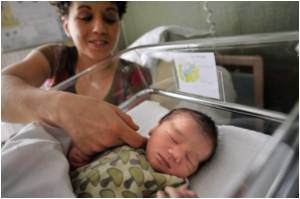
Education authorities in Seoul, the country's largest school district with 1.36 million pre-college students, last November banned corporal punishment.
Gyeonggi and one other province followed suit, with the new rule to take effect there in March.
The move has sparked intense debate in South Korea, where education is highly valued and physical punishment has long been tolerated -- if not encouraged -- to discipline students and push them to excel.
Entry to a prestigious college or university largely determines a career path and even marriage prospects. So parents and teachers often drive children to work harder through physical pain.
Slapping or spanking is a common punishment for missing homework, performing poorly in exams or chatting too loudly during class.
Advertisement
One survey showed about 70 percent of high school students experience corporal punishment. But injuries from severe beatings have sometimes led to bitter lawsuits filed by parents and jail terms for teachers.
Advertisement
"With about 40 students in each class and all parents demanding that their children go to good colleges, you just can't do the job without physical punishment," he said.
Each class in South Korean schools has 35.3 students on average, one of the highest among OECD member countries whose average is 23.9.
"It's the parents who still want teachers to use physical methods to make their children fare better in exams," Kim said.
But a four-minute video clip of a Seoul elementary school classroom made public in July ignited a debate that for long was the preserve of minority groups of liberal teachers and parents.
A cellphone video taken by a pupil showed a cursing and yelling middle-aged teacher smack the face of a sixth grader, hurl him to the floor and kick him repeatedly.
Seoul's education office, headed by a newly-elected former liberal education activist, seized on the public fury to ban all corporal punishment in schools later that year.
"Corporal punishment is barbaric, inhumane and often used by teachers simply to release their own anger. What's worse, it makes youngsters take violence in everyday life for granted," said Cho Shin, a spokesman for the office.
"No one had mustered the courage to put an end to this vicious, longstanding cycle. But now is the time to end it, no matter how tough it is doing so," he told AFP.
Teachers, however, say the sudden policy switch leaves them with few disciplinary alternatives.
"Some really rebellious kids already taunt me when I try to scold them for chatting too loudly during a class, saying 'Should I take out my cell phone?' or 'Now you're not supposed to hit me, are you?'" said one Seoul high school teacher who declined to be named.
Kim of the teacher's union said complaints had poured in from teachers since last year -- especially from women teachers who said they were harassed or beaten by students in response to scolding.
"We know times have changed and we shouldn't be hitting the students. But we really need other ways to punish those flouting rules and disrupting classes," he said.
Options suggested by the education office -- summoning parents or sending students to special self-reflection classes -- are little real use, he said, given the lack of special instructors and no clear guidance for parents.
Students are equally divided. A private survey last month of 23,000 middle and high school students showed about 50 percent support corporal punishment in classrooms while 40 percent are opposed and 10 percent undecided.
"When I get hit by teachers, I think that's usually for a good reason and I deserve it, though I feel a bit humiliated," said Jeon Jun-Su, a high school senior in the south-central city of Gimcheon.
"If I do something wrong, I'd rather get hit a few times than have my parents summoned. It's far easier and more convenient," he said.
The national education ministry last month tried to ease the controversy by allowing punishment that involves no beating such as push-ups. But Seoul's education office pledged to stick with the all-out ban, further confusing teachers.
"We are in the middle of a messy, chaotic transition," said Kim Chang-Hwan, a researcher at the Korean Educational Development Institute.
The researcher said the pervasive military culture under army-backed rule through the 1960s-1980s played a role in highlighting physical discipline in education, which should vanish eventually.
"This may be the price South Korean schools must pay for relying too much on physical punishment instead of using it as the last resort," he said.
Source-AFP









